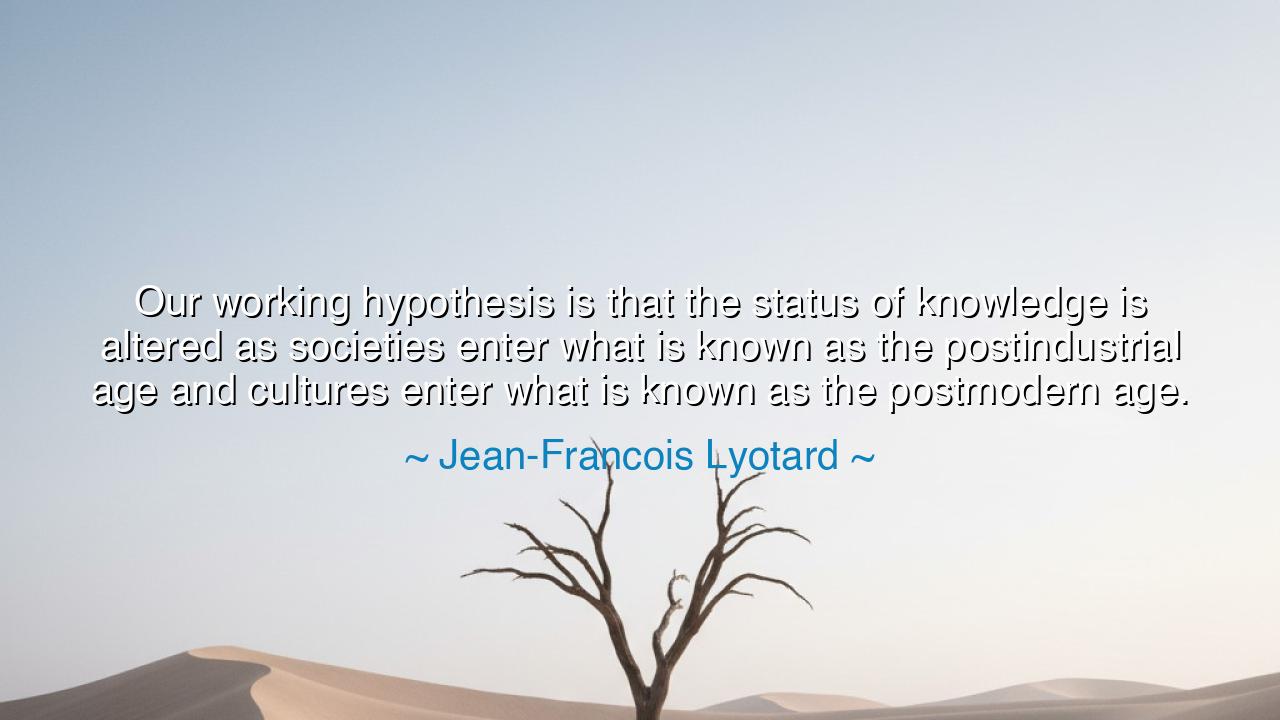
Our working hypothesis is that the status of knowledge is altered
Our working hypothesis is that the status of knowledge is altered as societies enter what is known as the postindustrial age and cultures enter what is known as the postmodern age.






"Our working hypothesis is that the status of knowledge is altered as societies enter what is known as the postindustrial age and cultures enter what is known as the postmodern age." – Jean-Francois Lyotard
In the unfolding scroll of history, there come moments when the very foundations upon which societies build their wisdom begin to tremble. Jean-Francois Lyotard, a philosopher of great depth, speaks here of a pivotal shift in human understanding—one that is rooted in the emergence of the postindustrial and postmodern ages. These terms, while perhaps foreign to some, carry the weight of an evolving truth: that as societies leave behind the industrial age, so too do they leave behind an older conception of knowledge—one that is linear, absolute, and rooted in the scientific and empirical ideals of the Enlightenment. The age that follows is one of fragmentation, complexity, and subjectivity—a time where knowledge no longer rests in the hands of a select few but is diffused, contested, and ever-evolving.
The postindustrial age, as Lyotard suggests, is a world in which the machine, which once defined progress and production, has now shifted to something more intangible—the information society. In the ancient world, knowledge was often something bound to the land or to the pursuit of physical labor. The philosophers of Greece, for example, sought to understand the world through contemplation, through the application of logic and reason. Yet, the advent of industry forever altered that path. With the birth of machines and factories, society began to value technological progress above all else. This brought with it the rise of science as the paramount means of gaining knowledge—each fact built upon another, each discovery adding to the growing edifice of human understanding.
But, as Lyotard notes, in the postindustrial age, this grand edifice begins to crumble. No longer is knowledge confined to facts and objective truths alone. The rapid advances of technology and the advent of the digital age have democratized knowledge, allowing anyone with access to information to participate in its creation and dissemination. What was once centralized in universities, research institutions, and authoritative sources has now become diffuse, fragmented, and open to constant revision. The truths of the past no longer hold the same power; instead, the status of knowledge itself is constantly in flux.
The ancient civilizations, from the Babylonians to the Romans, understood the power of knowledge. They built great libraries and centers of learning, with the belief that knowledge was the key to dominance and control. However, even in their most glorious moments, the seeds of change were present. The Renaissance, which followed the dark ages, was itself a postmodern awakening, a time when old ideas were questioned, when knowledge began to be seen as individualistic rather than universally agreed upon. It was during this time that the humanist movement rejected the rigid dogmas of the church, and thinkers like Copernicus and Galileo dared to challenge the established truths of the cosmos. Even then, the seeds of relativity in human understanding were sown, but it would take centuries for these seeds to bloom fully.
Lyotard’s insight into the postmodern age adds another layer of complexity to this ongoing evolution of thought. Postmodernism challenges the very nature of truth itself. It is an era where grand narratives—those overarching theories of truth and progress that once defined our understanding of history—are questioned, fractured, and deconstructed. In postmodernism, there is no single, all-encompassing narrative. Instead, we live in a world of multiple truths, where the individual perspective and local knowledge become just as valid as any universal claim to understanding. In this light, Lyotard’s statement is not merely an observation of academic shifts, but a philosophical challenge—a call to examine the very foundation of how we know what we know.
The lesson from Lyotard’s words is profound and far-reaching. As we stand at the threshold of this new era, we must recognize that knowledge is no longer a static monument, but a fluid and ever-changing river. Certainty, once prized above all else, must now be balanced with humility and the willingness to question, to accept that truths may not be absolute, but relative. This is not to say that facts have no place, or that reason and logic are irrelevant, but rather that we must learn to accept complexity and ambiguity in our understanding of the world. Progress, like the wisdom of the ancients, must be tempered by the understanding that knowledge is not a singular destination, but a journey that constantly unfolds.
In practical terms, this wisdom calls us to be flexible in our thinking, to embrace diverse perspectives, and to recognize the fluid nature of truth. We must seek to understand not just the facts, but the context in which those facts emerge, and the voices that contribute to the broader conversation. Whether in our personal lives, our professional endeavors, or in the greater social and political spheres, we must engage with knowledge not as a tool for control, but as a living, breathing thing that evolves with time. Be open to change, question the established truths, and seek to understand that in this postmodern age, the journey of learning is just as important as the destination. In this way, we honor the wisdom of both the past and the future.






AAdministratorAdministrator
Welcome, honored guests. Please leave a comment, we will respond soon